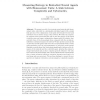Free Online Productivity Tools
i2Speak
i2Symbol
i2OCR
iTex2Img
iWeb2Print
iWeb2Shot
i2Type
iPdf2Split
iPdf2Merge
i2Bopomofo
i2Arabic
i2Style
i2Image
i2PDF
iLatex2Rtf
Sci2ools
ECAL
2007
Springer
2007
Springer
Measuring Entropy in Embodied Neural Agents with Homeostasic Units: A Link Between Complexity and Cybernetics
Abstract. We present a model of a recurrent neural network with homeostasic units, embodied in a minimalist articulated agent with a single link and joint. The configuration of the agent is determined by the total activation level or kinetic energy of the network. We study the complexity patterns of the neural networks, and see how the entropy of the neural controller state and agent configuration changes with the relative characteristic time of the homeostasis when compared with the excitatoryinhibitory activation dynamics of network. We also present a meta-model of embodied neural agents, that serves as conceptual framework to study self-perturbation and the self-organization in embodied neural agents. Simulation results show that homeostasis significantly influences the dynamics of the network and the controlled agent, allowing the system to escape fixed-points and produce complex aperiodic behavior. The relation between the characteristic time of homeostasis and the characteri...
| Added | 07 Jun 2010 |
| Updated | 07 Jun 2010 |
| Type | Conference |
| Year | 2007 |
| Where | ECAL |
| Authors | Jorge Simão |
Comments (0)

